Troubleshooting (TexText 0.11)
There are three main reasons why something may went wrong:
Your LaTeX code contains invalid commands or syntax errors.
The installed toolchain for the conversion of your code to a valid SVG element is for some reason broken.
TexText 0.11 contains a bug and you are the person who discovers it!
TexText 0.11 helps you to resolve such issues by offering detailed error and logging information.
This section is structured as follows:
LaTeX and toolchain errors
If compilation of your LaTeX code fails TexText 0.11 opens a dialog displaying the cause of the failure. In most cases a syntax error in your code will be the reason. TexText 0.11 filters the relevant information from the compiler output and displays it:
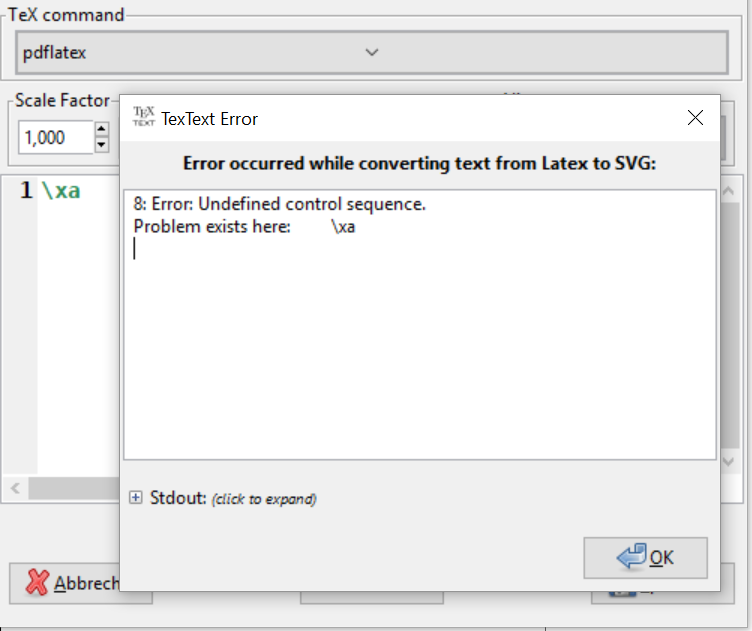
If you would like to see the full output of the LaTeX processor, click on the +
left to the stdout label:
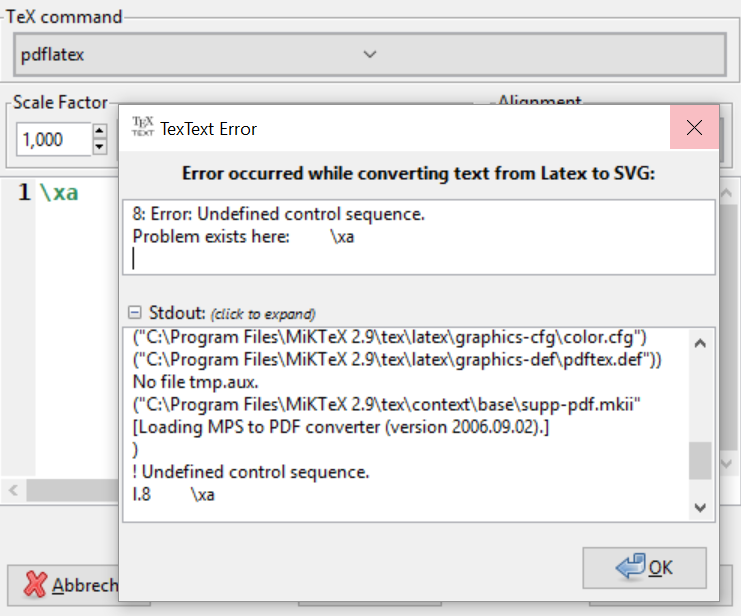
Sometimes nothing meaningful can be stripped from the LaTeX processor output, or nothing has been produced by LaTeX which can be parsed by TexText 0.11:
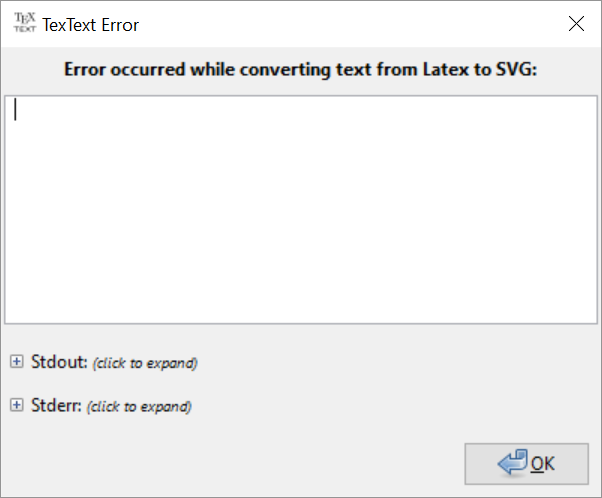
Most likely something serious failed during compilation and you may find additional
information under stderr , click on the + left to this label:
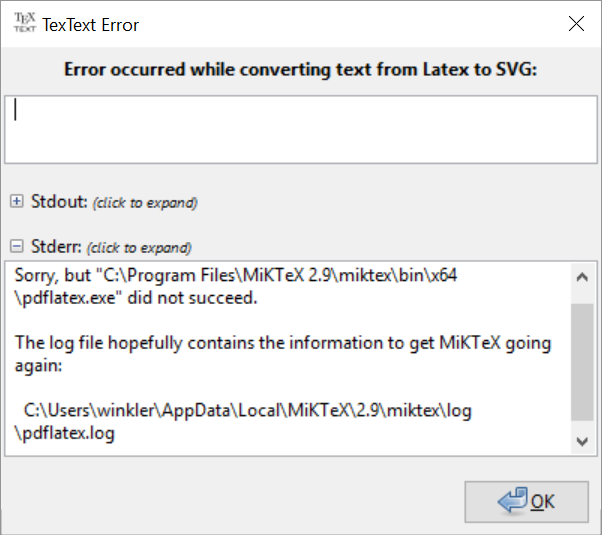
In that case follow the information given in the window (in the example given here: open the pdflatex.log in the AppData path).
Note
The stderr option is only available when errors have been piped by the
failed command.
Bugs in TexText 0.11
Of course, TexText 0.11 may contain bugs which may crash the plugin. If this happens an Inkscape error dialog is opened that will show something like this:
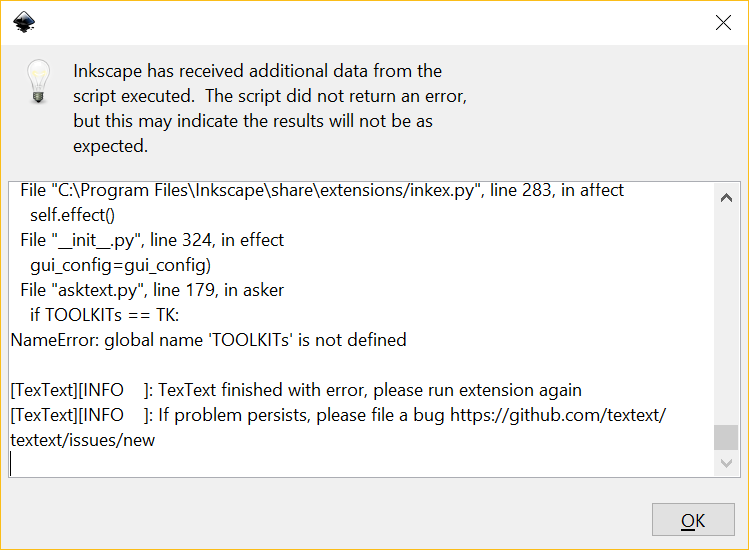
Note the advice at the end of the text view: You should run the extension again. Then, a logging mechanism is started which writes its result into the Inkscape error dialog:
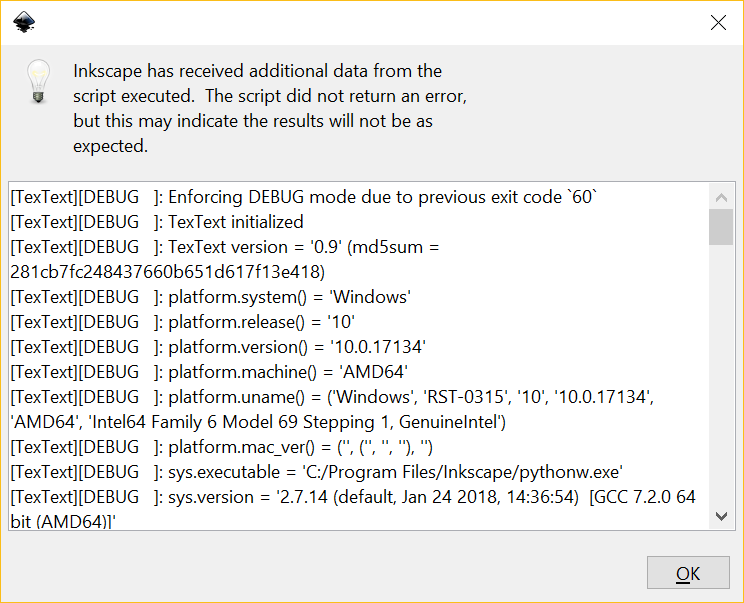
You can use this information to further analyze the problem or to open an issue on GitHub asking for help: https://github.com/textext/textext/issues/new
Important
Please carefully read the instructions in the issue template on GitHub so you pass all the required information to the developer team.
Manual use of the toolchain
For debugging purposes it may be required to manually process the steps usually done automatically by TexText 0.11. This procedure is also helpful if the result generated by TexText 0.11 does not match your expectations at all and you are unsure if this is an error of TexText 0.11 itself or of the programs used in the toolchain. Here is what you have to do in such cases:
Create a LaTeX document
test.texwith the following content:\documentclass{article} \usepackage{amsmath,amsthm,amssymb,amsfonts} \usepackage{color} \pagestyle{empty} \begin{document} % ***Your code*** \end{document}
Replace
% ***Your code***by the LaTeX code you want to compile and save the file to disk.Open a Terminal (Linux, MacOS) or Command Window (Windows)
On Linux: Open a file manager (e.g. Nautilus, Dolphin), navigate to directory of
test.tex. Right click and selectOpen in Terminal(Nautilus) or simply pressF4(Dolphin).On Windows: Open the explorer, navigate to the directory of
test.texand pressSHIFT + F10, then selectOpen Command Window Herefrom the context menu.
Compile this file using the command
pdflatex test.tex -interaction=nonstopmode -halt-on-error
Note
On Windows it may be required to put the name of the directory in which
pdflatex.exeresides in front ofpdflatex, e.g.c:\Program Files\MiKTeX 2.9\miktex\bin\x64\.If compilation succeeds open the generated file
test.pdfwith a pdf viewer and check its content. If it is as expected proceed with the next step.Check if the conversion from
pdftosvgsucceeds:If you use
pstoedit + ghostscriptenter the commandpstoedit -f plot-svg test.pdf test.svg -dt -ssp -psarg -r9600x9600 -pta
Note
On Windows it may be required to put the name of the directory in which
pstoedit.exeresides in front ofpstoedit, e.g.c:\Program Files\pstoedit\.If you use
pdf2svgenter the commandpdf2svg test.pdf test.svg
Note
On Windows it may be required to put the name of the directory in which
pdf2svg.exeresides in front ofpdf2svg, e.g.c:\Program Files\pdf2svg\.Open the generated file
test.svgwith Inkscape.
Check the generation from
svgtopngfor the preview image succeedsEnter the command
inkscape -f test.svg --export-png test.png --export-id content --export-id-only --export-dpi=200
Note
On Windows it may be required to put the name of the directory in which
inkscape.exeresides in front ofinkscape, e.g.c:\Program Files\Inkscape\.